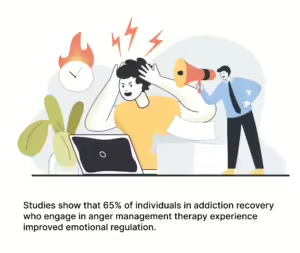Addiction recovery is a journey filled with challenges, requiring individuals to address not only substance use but also underlying emotional and behavioral patterns. One of the most critical aspects of successful recovery is managing anger—a powerful emotion that can significantly impact mental health and addiction treatment. In Boston, behavioral health programs focus on integrating anger management strategies into addiction recovery plans, providing individuals with the tools they need to navigate triggers, maintain sobriety, and achieve emotional well-being.
Greater Boston Behavioral Health is at the forefront of this approach, offering specialized programs that address anger and its role in addiction. Let’s explore why anger management is essential in recovery and how Boston’s behavioral health centers, including our own, are making a difference.
Understanding Anger and Its Role in Addiction
Anger is a natural emotional response to perceived threats or injustices. While it can motivate positive change when expressed constructively, unmanaged anger often leads to destructive behaviors. For individuals in addiction recovery, unresolved anger can:
- Act as a trigger for relapse.
- Damage relationships essential for support.
- Impede the healing process by increasing stress and emotional turmoil.
The Connection Between Anger and Addiction
Research shows that individuals struggling with addiction often use substances as a coping mechanism for difficult emotions, including anger. Over time, this cycle reinforces maladaptive patterns, making recovery more challenging.
Anger can be particularly problematic during the early stages of recovery. Without proper tools to manage it, individuals may feel overwhelmed, increasing the risk of returning to substance use. Addressing anger through targeted interventions is, therefore, a crucial component of behavioral health programs.
Boston’s Approach to Behavioral Health
Boston is renowned for its comprehensive approach to mental health and addiction treatment. Behavioral health centers across the city integrate evidence-based therapies with holistic strategies to address the complexities of recovery.
Key Features of Boston’s Behavioral Health Programs
- Personalized Treatment Plans: Recognizing that each individual’s journey is unique, programs are tailored to meet specific needs.
- Evidence-Based Therapies: Techniques such as Cognitive Behavioral Therapy (CBT) and Dialectical Behavior Therapy (DBT) are central to addressing anger and emotional regulation.
- Holistic Support: Incorporating mindfulness, yoga, and other practices to promote overall well-being.
- Focus on Community: Emphasizing group therapy and family involvement to build strong support networks.
At Greater Boston Behavioral Health, our mental health programs are designed to provide comprehensive care, addressing both the emotional and behavioral aspects of addiction recovery.
The Importance of Anger Management in Recovery
Anger management is not about suppressing anger but learning how to express it healthily and constructively. In addiction recovery, mastering these skills can:
- Reduce the risk of relapse by minimizing emotional triggers.
- Improve interpersonal relationships, fostering a stronger support system.
- Enhance overall mental health, making sobriety more sustainable.
Strategies for Managing Anger in Recovery
- Identifying Triggers: Understanding what provokes anger is the first step in managing it.
- Practicing Mindfulness: Techniques such as deep breathing and meditation can help individuals remain calm in stressful situations.
- Cognitive Restructuring: Reframing negative thoughts to reduce emotional intensity.
- Engaging in Therapy: Professional support through anger management or Cognitive Behavioral Therapy can provide essential tools for emotional regulation.
Programs Supporting Anger Management in Boston
Greater Boston Behavioral Health offers several programs that integrate anger management into addiction recovery. These include:
1. Intensive Outpatient Program (IOP)
Our IOP provides flexibility for individuals balancing recovery with daily responsibilities. Anger management techniques are a core part of the curriculum, equipping participants with strategies to handle triggers effectively.
2. Partial Hospitalization Program (PHP)
For those requiring more structured support, our PHP includes comprehensive therapy sessions focusing on emotional regulation, including anger management.
3. Group Therapy Program
Group settings allow individuals to share experiences, learn from others, and practice healthy communication skills. This collaborative approach fosters empathy and understanding, reducing feelings of isolation often associated with anger.
Therapies Offered for Anger Management
Our therapy programs are designed to provide robust support for individuals working to manage anger. Some of our specialized options include:
- Cognitive Behavioral Therapy (CBT): Focuses on identifying and changing negative thought patterns.
- Dialectical Behavior Therapy (DBT): Teaches emotional regulation and interpersonal effectiveness.
- Trauma Therapy Program: Addresses the root causes of anger linked to past experiences.
- Family Therapy Program: Encourages healthy communication within family units to resolve conflicts constructively.
Why Choose Greater Boston Behavioral Health?
At Greater Boston Behavioral Health, we understand the intricate connection between mental health and addiction. Our specialized programs provide the tools and support necessary to address anger and its impact on recovery. Key benefits of choosing us include:
- Experienced Professionals: Our team includes licensed therapists and counselors skilled in anger management.
- Comprehensive Care: From IOP to trauma therapy, we offer a full spectrum of services.
- Community Focus: We prioritize creating a supportive environment where individuals can thrive.
Don’t let anger stand in the way of your recovery. Contact us today to learn more about our programs and how we can help you achieve lasting sobriety.
FAQs About Anger Management in Addiction Recovery
1. Why is anger management important in recovery?
Anger management helps individuals navigate emotional triggers, reducing the risk of relapse and improving overall mental health.
2. What therapies are effective for anger management?
Evidence-based therapies such as CBT, DBT, and trauma therapy are highly effective in addressing anger and emotional regulation.
3. Does Greater Boston Behavioral Health offer group therapy?
Yes, our Group Therapy Program provides a collaborative space for individuals to learn and practice healthy communication skills.
4. Can anger management improve relationships?
Absolutely. Learning to express anger constructively can strengthen interpersonal relationships, fostering a supportive environment for recovery.
5. How can I get started with a program?
We offer evidence-based therapies tailored to each client’s needs, delivered by experienced professionals in a supportive environment.
Take the First Step Toward Healing
If anger is holding you back from achieving lasting recovery, it’s time to take control. At Greater Boston Behavioral Health, we’re here to guide you every step of the way.
Call us today: (888)278-0716
Contact us: https://greaterbostonbehavioralhealth.com/contact-us/
Discover how our tailored programs, including anger management, can transform your journey to recovery. Let’s build a brighter future together.


